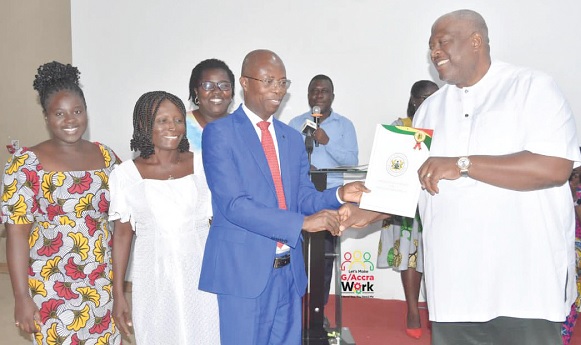
COVID-19 frontline workers honoured
Five thousand, nine hundred and four frontline healthcare workers have been honoured by the Greater Accra Regional Coordinating Council (GA/RCC) for their contributions to the region’s fight against the coronavirus (COVID-19) pandemic.
The awardees are contact tracers, drivers, researchers, disease control and surveillance teams, laboratory technicians, nurses, doctors, pharmacists, buriers, among others, from various health and other institutions which were mandated to lead the fight.
Commendation
At a presentation ceremony in Accra yesterday, the Greater Accra Regional Minister, Henry Quartey, commended the workers for their dedication and commitment which ensured the success of measures that had been put in place to curtail the spread of the disease.
He said the awards were aimed at recognising and honouring the workers for their efforts during the pandemic to serve as motivation to other healthcare workers and those in different sectors that their hard work was appreciated.
Though the COVID-19 period was overwhelming and burdensome, the Greater Accra Regional Minister said the frontline workers demonstrated selflessness and love for humanity by availing themselves to work in difficult circumstances.
Selflessness
Recounting the region’s COVID-19 experience, Mr Quartey noted that it became the epicentre of the pandemic in the country after recording more than 50 per cent of all recorded cases.
He said that resulted in undue pressure on health facilities and personnel, leading to some officers working overtime and beyond their limits to ensure the fight against the pandemic was brought under control.
The Regional Minister thus lauded health workers and other Ghanaians for their ingenuity, creativity and entrepreneurial capacity which supported the government’s interventions to prevent the spread of the disease.
“The period saw the invention and reinvention of tools, materials and processes to support the fight.
It also showed how together, we are able to achieve plenty.
“Our facilities were tested, our personnel were tested and our nation was tested, but we showed tenacity and resilience.
“At our worst, when some of the suburbs of Accra were locked down, notwithstanding the usual Ghanaian nature of flouting every rule, we survived the heat and men and women of the health profession were all out ensuring we overcame the pandemic,” Mr Quartey said.
He expressed gratitude to health professionals who contracted the virus and those who lost their lives in the line of duty and service to the nation, saying that they would be remembered forever.
“Through your hard work and dedication, and the commitment of the government, Ghana was among the first nations that received lots of commendation for the measures put in place to contain the virus and was thus part of the first countries to be declared best fighters against COVID-19.
We are here today because of you.
The nation honours you today as a recognition of your unwavering fight to the pandemic,” Mr Quartey stated.
Strategies
The Director-General of the Ghana Health Service (GHS), Dr Patrick Kuma-Aboagye, said the service was working with other agencies to put in place strategies to prepare the country for such outbreaks in future.
Among the strategies, he said, were the strengthening of infection prevention and control measures, ensuring requisite medications were available, improving early warning systems and enhancing public health responses.
Insurance policy
The Chairman of the Greater Accra Regional Directors of Health, Rev. Dr Ebenezer Asiamah, expressed gratitude to the government for the recognition and acknowledgement.
He, however, decried the absence of an insurance policy for health workers, saying the situation was a disincentive to health workers who were exposed to various risks while providing services.
He, therefore, called on the government to consider health workers in the development of national policies and create the environment for health workers to voluntarily move to rural areas to offer their service.
“We sacrifice daily and the public’s concern is our concern.
We plead that you put in the plans that will care for our health as well,” Dr Asiamah added.
